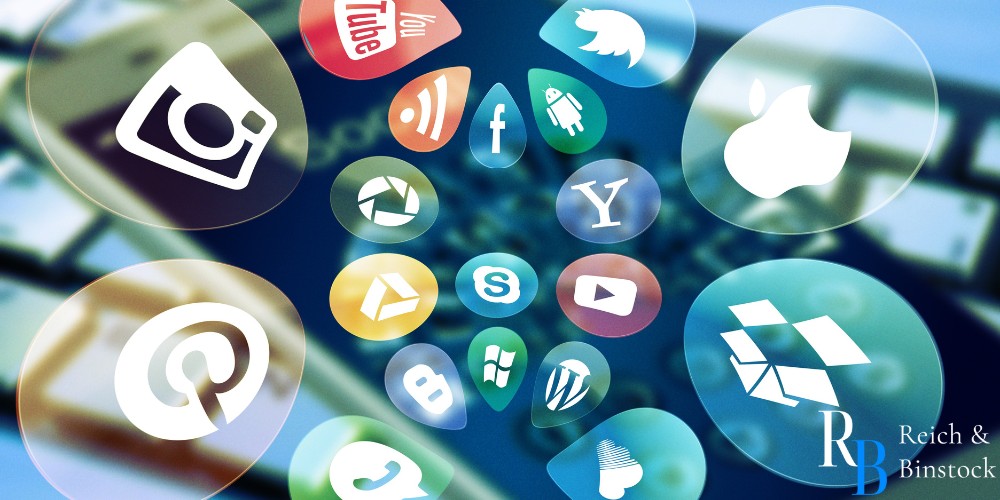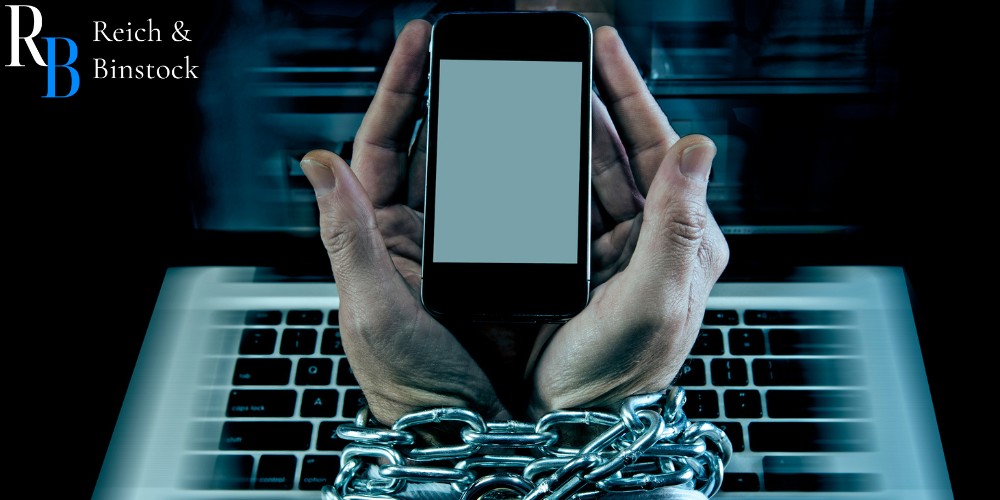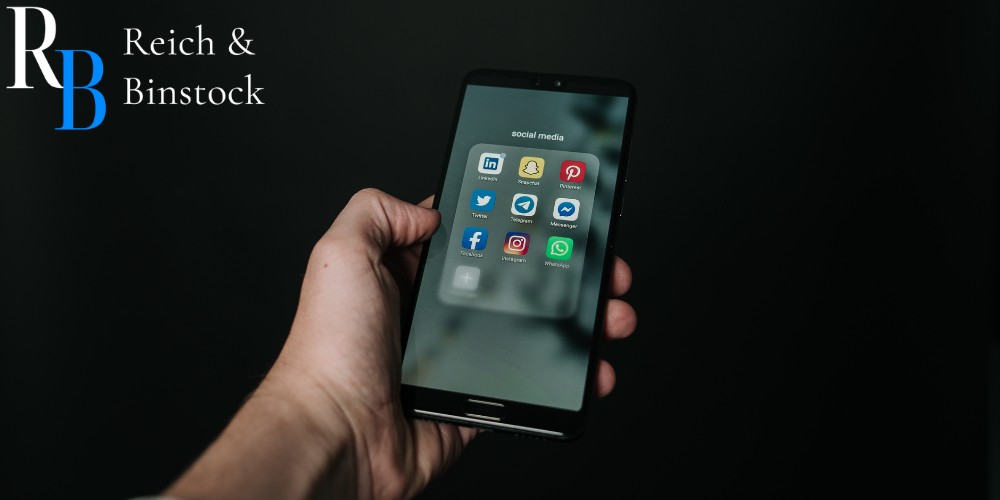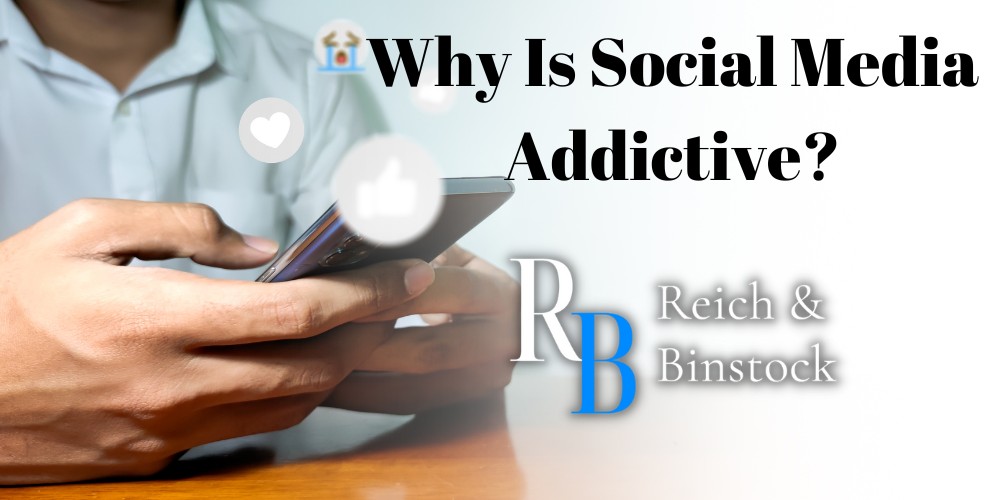We have all done it. Pick up the phone, scroll social media and before you know it, you come out of the zone to realize hours have passed and you have no idea where the time went. You just wanted to check in on friends and family, but you ended up spending hours online. Social media can be a great way to connect to people, but it can also be a crutch to feel connected to the world without ever having to leave your home. So, why is social media addictive and what can you do to avoid the addiction?
Social media is the new addiction that is not only affecting adults but children and teens as well. Social media addiction is described as a behavioral addiction that includes being excessively concerned with social media, having an urge that can’t be controlled to log on to or use social media, and spending all your time on social media causing other relationships to be changed.
As of January 4, 2023, there are 4.9 billion social media users worldwide. Social media addiction statistics in 2024 show that adults spend an average of 2 hours a day on social media sites. Unfortunately, that number is much higher for adolescents, and this has many negative consequences for their lives.
Why Is Social Media Addiction so Relevant?
Addiction is a disorder of the reward system in the brain. It can be characterized by a strong craving or compulsion that causes you to act without any regard to consequences. Studies have shown that at least 10% of Americans are addicted to social media. Problematic social media use can cause issues in real-life relationships. Researchers are seeing an increase in mental health issues, especially in adolescents, due to social media.
How Many People Are Addicted to Social Media Platforms?
According to data from the Addiction Center, approximately 5 to 10% of Americans meet the social media addiction criteria. This could be as many as 33 million Americans or more. Many of these people are children, teenagers, and young adults.
Is Social Media Addictive?
Yes, social media can be addictive for many people. The design of social media platforms often incorporates elements that trigger psychological rewards, such as likes, comments, and shares, which can create a cycle of seeking validation and engagement.
Additionally, the constant stream of new content and notifications can make it challenging for users to disengage. This combination of factors can lead to compulsive behavior, a feeling of dependence on social media platforms, and unhealthy social media habits.
Social Media Addiction Symptoms
Some of the most common signs of social media addiction include the following.
- Excessive time spent on social media
- Preoccupation with social media and constantly thinking about it or checking for updates
- Experiencing irritability, anxiety, or depression when unable to use social media
- Neglecting responsibilities at work, school, or home
- Strained relationships with family and friends
- Sleep disturbances
- Mood swings based on social media interactions
- Failed attempts to cut down on social media use
- Negative impacts on self-esteem
- Headaches or eye strain due to prolonged screen use
What Are the Causes of Social Media Addiction?

The causes of social media addiction include addictive behavior, stress, low self-esteem, and social anxiety. These factors drive a person to continue with the excessive use of social media apps to drive out negative feelings. However, the algorithms used in social media tend to encourage addictive behaviors in users as well. Many people develop a psychological dependency on social media, or even an Internet addiction.
Is Social Media Made to Be Addictive?
Yes, social media and its algorithms are intended to be addictive. Social media companies and advertisers make more money when people spend more time on their platforms.
It’s the first thing you check in the morning. Those notifications may determine what kind of day you’ll have. Will you have those thousands of likes on your photo to prove your popularity? What can you do today that will lead to more followers and likes? How can you gain more attention through the screen? It’s by design that you crave opening your phone to find out what rewards you received from the last photo you posted.
Why is social media addictive? The more time you spend on social media, the more money the social media platforms make. If the app can keep you watching cat videos for hours, they become just a little richer at your expense.
Why Is Excessive Social Media Use So Widespread?
Your image in online social networking can be anything you want it to be. You don’t have to be that quiet, shy person that you are in real life. Especially if you can get positive feelings from the likes produced by the person you play on social media. Your mobile device has now created a new life for you.
Social media can also be a distraction. It can temporarily make your problems disappear. It can become your coping mechanism after a hard day at work. Your personal problems vanish for an hour, and your school responsibilities can wait. Ignoring real-life relationships becomes easy as you enjoy your screen time.
The fear of missing out is another driving force behind social media addiction. When you open social media to see your peers at a party or an event that you could not attend, you feel FOMO (fear of missing out). Did they miss you because you could not come? What happened while you weren’t there? This anxiety-induced fear will have you opening social media to check photos and comments on your friends’ pages to make sure you didn’t miss something big.
How Is Social Media Addictive?
Social media is addictive due to its design features that trigger psychological rewards and create a cycle of reinforcement. Elements like likes, comments, and shares provide instant gratification, activating the brain’s reward system. Additionally, the continuous stream of new content and notifications keeps users engaged, fostering a sense of FOMO (fear of missing out) and making it difficult to disengage.
The addictive nature is further fueled by all popular social media platforms’ algorithmic designs, which tailor content to individual preferences, creating a personalized and immersive experience that encourages prolonged usage.
How Does Social Media Affect the Brain?

Social media has changed the way we communicate, learn, share, and engage with each other. It is also changing the way our brain works. The constant ability to access social media through smartphones means our brains are exposed to high volumes of stimulation and our neurons are firing all day long. This can change the neurological makeup of our brain.
A 2019 British study tied social media use to decreased, disrupted, and delayed sleep, which is associated with depression, memory loss, and poor academic performance. Social media use can affect users’ physical health even more directly. Researchers believe that since social media competes for your attention with the promise of continuous new content, this leads to a decrease in cognitive performance and shrinks parts of the brain associated with maintaining concentration.
What Is a Dopamine Loop?
Social media affects the brain by activating its reward circuitry and releasing dopamine, a neurotransmitter that creates feelings of pleasure and desire. To keep users coming back for more, social media platforms produce the same neural circuitry that is caused by gambling and recreational drugs. Studies have shown that the constant stream of retweets, likes, and shares from these sites causes the brain’s reward centers to trigger the same kind of chemical reaction seen with drugs like cocaine.
Being on social media increases dopamine signals in the brain. The brain then identifies social media use as a rewarding experience that a person does for survival and needs to repeat again. The body develops a tolerance to dopamine, resulting in a need for higher dopamine levels in order to experience pleasure. A compulsion to continue seeking the substance becomes a matter of survival rather than pleasure. The way your brain engages in this positive reinforcement is also seen in other addictions.
Dopamine-Seeking Behavior
Rewards in social media come in the form of likes and comments from your peers. Since these rewards increase the release of the feel-good hormone dopamine, people will continue on social media to feel the pleasure that comes from the attention. The positive feedback tells your brain that it needs more social media to release dopamine.
How to Recognize Social Media Addiction

Your digital well-being is important. The Internet is a staple in our lives now. With social media come positive feelings and negative effects. Raising awareness for social media addiction will help more people spot the signs before it’s too late.
Signs that you may be addicted to social media include:
- Large amounts of time spent on social media apps
- Social media stays in your thoughts at all times
- If you spend less time in real life and more time on the computer using social media
- Using social media so much that you stop communicating with others face-to-face
- Experiencing social media withdrawal
- Coping with negative feelings by using social media
Social Media and Mental Health
Social media can give users a false sense of other users’ lives. This can lead to low self-esteem and the fear of never being good enough. When you only see the positive side of someone else’s life, you can develop feelings of inadequacy, which can lead to depression and anxiety. Comparing yourself to the edited version of someone else can cause unhappiness and self-consciousness.
Social Media and Emotional Health
When you get likes and comments on social media, your dopamine levels rise, giving you a temporary feeling of happiness. It makes you feel included and loved. The attention you get from social media can help relieve undesirable moods.
Data suggests some people can experience the opposite effect of loneliness, feeling isolated, detached, or sad. Studies have shown a link between the time a person spends on social media and the chance of developing mental health problems such as depression, anxiety, body image issues, self-harm, and suicidal thoughts. This has a huge effect on the daily life of people.
What Is My Risk of Social Media Addiction?

Social media can become addictive without you realizing it. If you have ADHD, OCD or any similar disorder it can be easier for you to become addicted to social media. If you catch yourself using social media to relieve stress then you should try another approach like yoga or a walk. When you see an increased reliance on comments and likes from others to make you happy, it is time to unplug. Staying connected is part of our everyday life now, but the negative impacts can far outweigh the good in some cases.
Why Are Teenagers More at Risk of Social Media Addiction?
Adolescence is the second-biggest period of brain growth. Because teens’ brains and social skills are rapidly developing, they are more prone to social media’s addictiveness. Overusing social media can lead to rewiring a young child or teen’s brain to seek instant reward. It can lead to and make compulsive, obsessive, and addictive behaviors worse.
Social media can have a negative impact, especially on tweens and teens. Adolescents are at the highest risk of falling into addiction for three basic reasons. Teens have a tendency to be impulsive and have a need for social influence. They also have a need to prove their identity.
How Many Teens Are Addicted to Social Media?
Young people are drawn to social networking sites. A large national survey shows that ninety percent of children ages 13 to 17 have social media accounts. They use instant messaging services to contact their friends and family. Social media use among this age group has increased each year since social media platforms began.
Social media can have a negative impact on people of a young age. Cyberbullying, eating disorders, anxiety, depression, self-harm/suicidal thoughts, and sleep issues can all be attributed to excessive social media use.
What Can I Do to Prevent Addiction to Social Media?
It can be hard to break away from social media, but it is important to set boundaries and stick to them to avoid becoming addicted. A few ways to prevent addiction are turning off notifications, limiting your social media usage to 15-30 minutes a day, turning your phone on silent, deleting unnecessary apps, and reducing your number of social media friends.
It is especially important to limit screen time for children. A digital detox is a great way to help children who may be overusing social media. Working on family relationships and doing physical activities outdoors can help with any social media withdrawal symptoms. Putting up mobile phones during breakfast, lunch and dinner and engaging in conversation is another helpful option. Less time spent scrolling is better for children and adults alike.
What to Do Instead of Social Media Usage
Here are some tips for preventing social media addictions:
- Turn to other activities: Fresh sunshine is great for your health. Taking a walk, playing outside, or even reading a book in the sun not only helps keep you off social media, but it also adds the Vitamin D that everyone needs. If it’s a rainy day, a puzzle or a board game can pass some time in a fun way.
- Be specific: Negativity is contagious. We’ve all been around someone who can spin a happy moment into a negative experience. It’s vital to keep that toxicity from spilling into your everyday life. If a person changes your mood when you see their posts, it’s time to remove them from your feed.
- Limit social media: Using your phone before bed can cause your sleep to be disrupted. It is suggested by experts to put your phone away at least 1-2 hours before bed. Spending time on fun activities can take your mind off of social media apps. Picking up a new hobby can also help in treating social media addiction.
- Talk to a professional: A therapist can help you determine why you might feel the need to scroll and post. You may have underlying issues that are contributing to your dependency on social media.
Should I File a Social Media Addiction Lawsuit?

If you or a loved one have been harmed by social media, you should file a lawsuit. Some examples of the harms of social media usage are self-harm/suicide, eating disorders, anxiety, and depression. By filing a lawsuit, you will be sending a message to social media platforms that they can no longer use the algorithms that are adding to mental health problems in social network users.
These companies have intentionally created algorithms that make social network users repeat unhealthy behaviors. When they cannot maintain a healthy relationship with social media due to dopamine loops, their mental health could seriously suffer.
Contact a Social Media Addiction Lawyer at Reich & Binstock Today
When social media began in the 1990s, we did not anticipate its impact today. It’s hard to predict the future and the effects of such a phenomenon. But after research and studies, we now have an idea of its harmful effects on not only children but adults as well. It’s well past time for change and accountability for each social media platform responsible for these addictive behaviors.
Contact a social media addiction lawyer today and start the process for change. If you have experienced harm from social media please call Reich & Binstock today at 713-622-7271. The consultation is free. Let us help you fight for your right to compensation.













